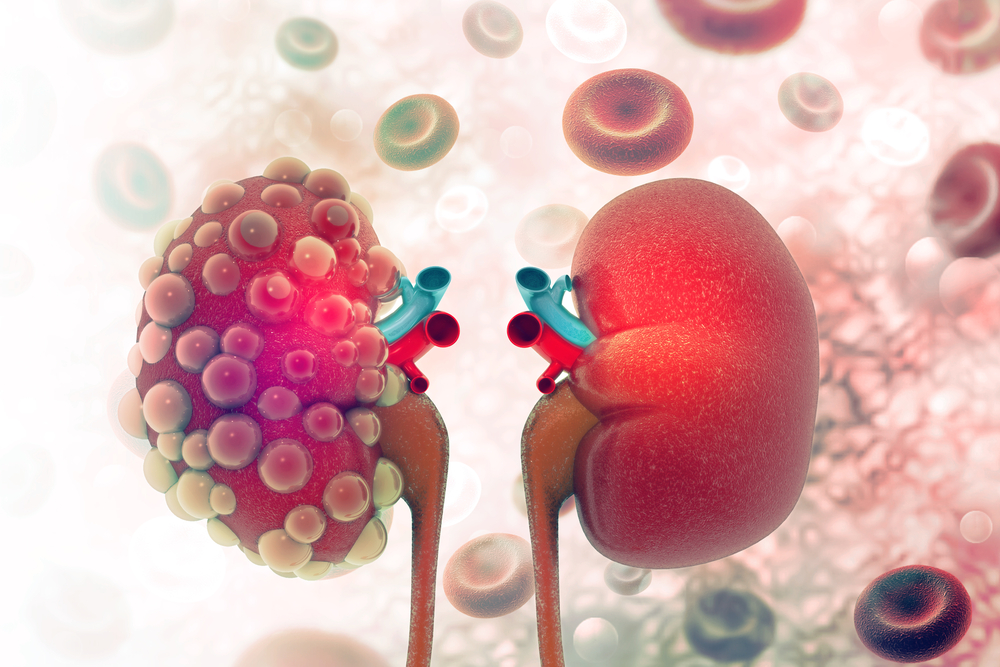
Overview
Kidney cancer involves malignant cell growth in the kidneys. Renal cell carcinoma is the most frequent form of adult kidney cancer. However, there are also other, less frequent forms of kidney cancer. For instance, Wilms’ tumor is a type of kidney cancer that is more prevalent in children.
The frequency of kidney cancer is rising at an alarming rate globally. Fortunately, the disease is usually diagnosed in its earliest, most treatable stages, when it has not spread beyond the kidneys.
Key Facts
- Men are more likely than women to be diagnosed with kidney cancer before age 85, with a 1 in 47 chance for men and a 1 in 100 chance for women.
- Kidney cancer has a 79% five-year survival rate.
- Renal cell carcinoma accounts for around 90% of kidney cancers, and it almost always manifests as a single tumour in just one kidney.
- People who smoke excessively are more likely to contract kidney cancer.
- Usually, renal cell cancer can be cured if the condition is diagnosed and treated when the tumour is still localised to the kidney and immediately surrounding tissue.
Types of Kidney Cancer
According to Cancer.Net, these are the types of kidney cancer:
- Renal cell carcinoma: About 85 percent of all cases of kidney cancer in adults are diagnosed as renal cell carcinoma. The proximal renal tubules, part of the kidney’s filtration system, are the development site of this cancer. Every kidney has thousands of these little filtration units.
- Wilms tumor: Wilms tumour affects children significantly and is handled differently than adult kidney cancer. This condition accounts for around 1% of all kidney cancers. When paired with surgery, chemotherapy and radiation therapy have a better chance of successfully treating this tumour than other types of kidney cancer. Consequently, therapy strategies have improved.
- Urothelial carcinoma: Urothelial carcinoma (transitional cell cancer) is responsible for 5-10% of all cases of adult kidney cancer. Urothelial carcinoma develops in the kidney’s renal pelvis, the drainage area from the kidney to the bladder. Due to its shared origin in the cells that line the renal pelvis and bladder, this kind of kidney cancer is treated similarly to bladder cancer.
Symptoms
Symptoms of kidney cancer are generally nonexistent in the disease’s first stages.
Some of the signs and symptoms include:
- Blood in the urine
- Nocturia (nighttime urination) or a shift in your urine color (to black, rust, or brown)
- Discomforts in the side or lower back area that is not due to an injury
- Bloated stomach
- Chronic fatigue
- Abrupt, seemingly random weight loss
- Common cold (flu)
Note that these symptoms are not exclusive to kidney cancer and may indicate other diseases. Talk to your doctor if you’re worried.
Diagnosis
Some of the diagnostic procedures for kidney cancer include:
- Diagnostic imaging: Ultrasounds, chest x-rays, CT scans, MRIs, and radioisotope bone scans are some of the imaging techniques that can be used to determine if kidney cancer has spread to other parts of the body.
- Biopsy: A tissue sample, or biopsy, is taken for microscopic inspection to help diagnose malignancy. However, imaging scans are excellent at revealing whether or not a kidney tumour is cancerous. Therefore, biopsies are usually not required before therapy for kidney cancer. If a biopsy is necessary, an interventional radiologist will insert a hollow needle through your skin to remove a tissue sample in the form of a core.
- Testing of blood and urine: Blood and urine tests are used to check for general health issues and renal problems but can’t diagnose cancer.
Causes
The exact cause of kidney cancer is unknown, but there are some risk factors.
The following can increase your risk of kidney cancer:
- Smoking: Cigarette smokers are about twice more likely to acquire kidney cancer than non-smokers.
- Mining, welding, farming, and painting can expose workers to carcinogenic chemicals, such as arsenic, cadmium, and certain metal degreasers.
- History of kidney cancer in one’s family
- Being overweight: Having a BMI of 30 kg/m² or higher
- High blood pressure
- Gender: Men are more susceptible to kidney cancer than women.
Prevention
You may lower your chances of contracting kidney cancer through the following preventive measures:
- Quit smoking: If you have a family history of kidney cancer, you should quit smoking. There are various ways to stop smoking, such as support groups, medications, and products that replace nicotine. Tell your consultant or therapist you want to quit and they can advise you on what to do.
- Keep your weight in a good range: Try to keep your weight at a healthy level. If you are overweight or obese, cut back on how many calories you eat every day and try to be active most days of the week. Ask your doctor if there are other healthy ways you can lose weight.
- Control your blood pressure: At your next visit, ask your healthcare provider to check your blood pressure. If your blood pressure is high, you and your doctor can talk about ways to lower it. Exercising, losing weight, and eating healthy meals are some beneficial measures. To lower their blood pressure, some patients may need to take medications. Talk to your physician about your choices.
Typical Treatments
According to the Mayo Clinic, the possible treatment procedures for kidney cancer include:
- Nephrectomy: Partial or total removal of the affected kidney is called nephrectomy. Nephrectomy can be accomplished through a single cut in the abdomen or side (open nephrectomy) or a sequence of small cuts in the abdomen (laparoscopic nephrectomy).
- Targeted therapy: Targeted therapy works by counteracting the effects of the cell signalling protein that helps cancer cells function. Your doctor may suggest you have a test done on the cancer cells to find out which targeted drugs are most likely to work.
- Immunotherapy: Immunotherapy is a method of fighting cancer through your immune system. Your immune system may not be able to fight the disease on its own because the cancer cells produce proteins that shield them. However, immunotherapy stimulates and boosts your immune system’s natural defense.
- Radiation therapy: Radiation therapy kills cancer cells by sending them powerful beams of energy from sources like X-rays and protons. When kidney cancer has spread to other parts of the body, such as the brain or bones, radiation therapy is sometimes used to control or lessen the symptoms.
Conclusion
Kidney cancer is a quite common disease. Prevention, early detection, and prompt treatment are some effective ways to neutralise the disease. Furthermore, see a professional healthcare provider immediately if you suspect you have kidney cancer. This action will prevent the disease from spreading.
MOST COMMON






